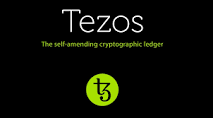Tezos is the latest ICO (Initial coin offering) to enter the frantic world of crypto currencies.
The date has now been set for the 1st July to allow participants to arrange their payments. Tezos is based in Zug, Switzerland.

Tezos ICO confirmed for the 1st July.
.
The self-amending cryptographic ledger – www.tezos.com
.
Tezos is a decentralised blockchain that governs itself by establishing a true digital commonwealth. What’s more, Tezos was built to facilitate formal verification, a technique which boosts the security of the most sensitive or financially weighted smart contracts by mathematically proving the correctness of the code governing transactions.
.
The Tezos blockchain will underpin secure, decentralised applications and smart contracts while avoiding some of the political and technological problems which earlier efforts such as Bitcoin and Ethereum have faced. Tezos was built on the belief that a deep commitment to security, formal verification, and governance that gives stakeholders the power to make protocol decisions is the formula for earning trust and generating widespread adoption on the blockchain. This document provides a comprehensive overview of Tezos, its applications and benefits, the developers involved in the project, the upcoming Tezos fundraiser (sometimes loosely called “ICO” or “crowdsale”), the Tezos Foundation and the goals the Foundation hopes to achieve.
.
Work on Tezos began in 2014 by its founding development team, whose academic experience spans from philosophy to physics, mathematics and computer science, along with professional experience that includes positions at Goldman Sachs, Morgan Stanley, The Wall Street Journal, and Accenture. They recognized that decentralised blockchains share the same challenges that exist in any commons (the name economists give to a resource shared by several people), specifically that challenges around governance and maintenance often lead to stagnation, shortages, and political deadlock. In the case of pioneers like Bitcoin and Ethereum, those challenges have manifested themselves in situations that put too much power in the hands of core development teams or miners. In other words, first-generation blockchains have become subject to a form of centralization that their developers sought to avoid. During three years of development, the Tezos team sought to address the need for decentralized innovation in protocol design and emphasised the importance of formal verification in its software design philosophy.











